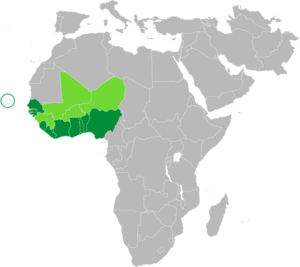Economic Community of West African States
 Dark Green: 11 Members, Light: 4 Suspended | |
The Economic Community of West African States (ECOWAS; also known as CEDEAO in French and Portuguese) is a regional political and economic union of fifteen countries located in West Africa. Collectively, these countries comprise an area of 5,114,162 km2 (1,974,589 sq mi), and in 2019 had an estimated population of over 387 million.
Considered one of the pillar regional blocs of the continent-wide African Economic Community (AEC), the stated goal of ECOWAS is to achieve "collective self-sufficiency" for its member states by creating a single large trade bloc by building a full economic and trading union. The union was established on 28 May 1975, with the signing of the Treaty of Lagos, with its stated mission to promote economic integration across the region. A revised version of the treaty was agreed and signed on 24 July 1993 in Cotonou.
ECOWAS also serves as a peacekeeping force in the region, with member states occasionally sending joint military forces to intervene in the bloc's member countries at times of political instability and unrest.
Member states
As of February 2017, ECOWAS has 15 member states; eight of these are French-speaking, five are English-speaking, and two Portuguese-speaking. All current members joined the community as founding members in May 1975, except Cape Verde which joined in 1977:
- Benin
- Burkina Faso
- Cape Verde
- Gambia
- Ghana
- Guinea
- Guinea-Bissau
- Ivory Coast
- Liberia
- Mali
- Niger
- Nigeria
- Senegal
- Sierra Leone
- Togo
The only former member of ECOWAS is Arabic-speaking Mauritania, which was also one of the founding members in 1975 and decided to withdraw in December 2000. Mauritania recently signed a new associate-membership agreement in August 2017.
Morocco officially requested to join ECOWAS in February 2017. The application was endorsed in principle at the summit of heads of state in June 2017, but Morocco's bid for membership was stalled.
Suspended members
Mali was suspended from ECOWAS on 30 May 2021, following its second military coup within nine months.
Guinea was also suspended on 8 September 2021, shortly after a military coup took place in the country. Sanctions were placed on both countries on 16 September 2021.
On 10 January 2022, Mali announced its decision to close its borders and recalled several ambassadors with ECOWAS in response to sanctions imposed for deferring elections for four years.
On 28 January 2022, Burkina Faso was suspended from ECOWAS following a military coup.
Niger was suspended from ECOWAS after the 2023 coup d'état, led by General Abdourahamane Tchiani, caused the Nigerien crisis.[1]
Threat of military action
ECOWAS threatened military intervention in Niger if President Mohamed Bazoum was not restored to office by 6 August 2023.[2] However, Algerian president Abdelmadjid Tebboune expressed his opposition to any military intervention, stating "a military intervention could ignite the whole Sahel region and Algeria will not use force with its neighbours".[3]
On 6 August 2023, the junta gave the former colonial power France 30 days to vacate Niger, in accordance with the 1977 Agreement of Technical Military Cooperation.
References
Wikipedia is not affiliated with Wikispooks. Original page source here